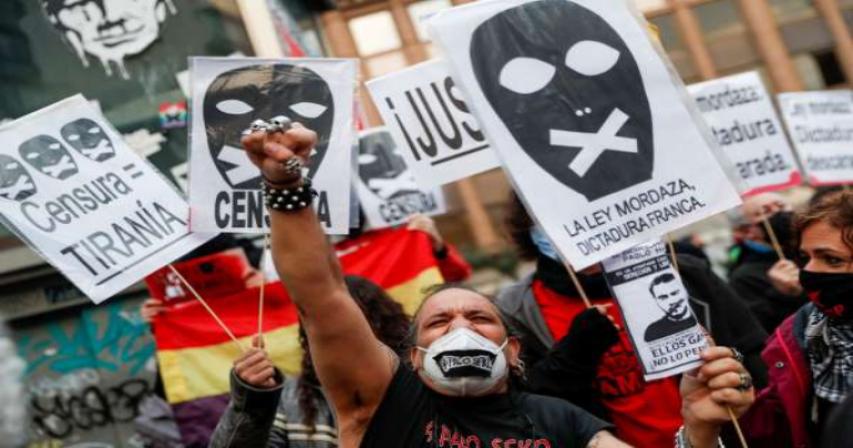Pablo Hasel protests - Thousands demand rapper's release in Spain
- 4 years ago

Thousands of people have taken to the streets in Spain overnight in support of a jailed rapper.
There were clashes in Barcelona as police tried to disperse the protesters.
Pablo Hasel was taken to prison on Tuesday, after barricading himself in a university to avoid arrest.
He faces nine months in prison for glorifying terrorism and slandering the crown and state institutions over tweets and song lyrics.
Hasel's case has reignited a debate about free speech in Spain.
Demonstrations were reported in cities across the Catalonia region and in the eastern city of Valencia on Tuesday night, hours after Hasel began serving his sentence.
In Barcelona, around 2,000 people joined protests and waved placards reading "Free Pablo". Some violence was later reported on as police moved in and demonstrators set rubbish bins alight and threw objects.
The biggest demonstration involved 5,000 people in the city of Girona while hundreds more gathered in Lérida (Lleida in Catalan), where the rapper was arrested earlier in the day. Another 2,000 people called for Hasel's release in his home town of Segrià, according to Catalan media.
Fifteen protesters were arrested and 33 people were hurt including 17 police officers. The court building in Vic near Barcelona came under attack and the police station was damaged.
Members of the Catalan police force, known as Mossos, entered the University of Lleida on Tuesday morning after the rapper defied a deadline to hand himself last Friday.
His supporters, who had joined Hasel inside the building, sprayed fire extinguishers at police before the singer was led away, shouting "they will never silence us; death to the fascist state".
More than 200 artists, including film director Pedro Almodóvar and Hollywood star Javier Bardem, have signed a petition against Hasel's jail term, while Amnesty International described his arrest as terrible news for freedom of expression in Spain.
Fellow Spanish rapper Valtònyc, who fled to Belgium in 2018 after being convicted of similar offences, told the AFP news agency he felt "shame" and "anger at seeing a colleague treated like this for doing what artists do, which is to provoke".
The Spanish government said last week it planned to reduce the penalty for "crimes of expression" - including the glorification of terrorism, hate speech and insults to the crown and religion - in cases that involve artistic or cultural activities. Besides attacks on the monarchy, Pablo Hasel's tweets and lyrics accused police of torturing and killing demonstrators and migrants.
Pablo Hasel - whose real name is Pablo Rivadulla Duro - was found guilty of glorifying terrorism in a separate case in 2014, but his prison sentence was suspended in 2019 on condition that he did not reoffend within three years.
Source: BBC
Comments